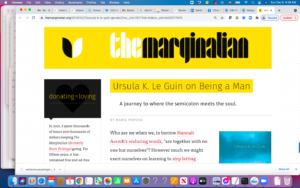Networking instead of combat?

I love this quote from biologist (and Carl Sagan’s wife) Lynn Margulis and her son Dorion Sagan: “Life did not take over the globe by combat, but by networking.”
Opposing the Darwinian idea that survival of the fittest has to be a competition where one species triumphs while others must retreat, this brief excerpt from Joanna Macy and Chris Johnstone’s book Active Hope: How to Fix the Mess We’re In without Going Crazy talks instead about symbiosis: different species helping each other, rather than clawing themselves to the top at others’ expense. The quote from Margulis and Sagan is in the very first paragraph.
The world is full of examples of amazing symbiosis–from the macro level of the breath cycle (we take the oxygen that plants emit and convert it to the carbon dioxide they need to flourish) to the micro level: “shrimp and gobies clean fish, receiving nutrients as they remove parasites, dead tissue, and mucous from the hosts.“
Margulis died several years ago, but I heard her give a fascinating talk on bacterial societies (which are quite complex) at an amazing Bioneers conference. I didn’t take great notes on her session, but took substantial notes at other sessions.

